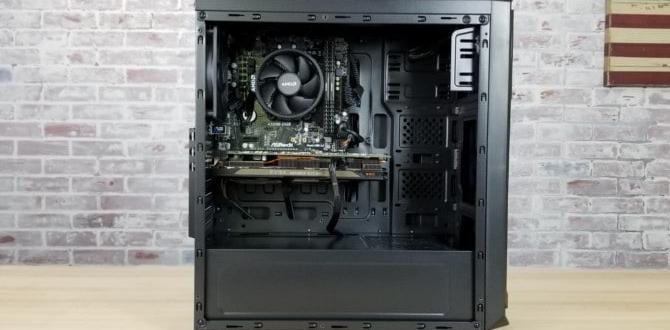Researching Components
Research the i7 8700k specifications
To kickstart the process of building a budget gaming PC with an i7 8700k processor, it is crucial to delve into the specifications of this powerful CPU. The i7 8700k is a high-performance processor with 6 cores, 12 threads, a base clock speed of 3.7GHz, and a max turbo frequency of 4.7GHz. Its impressive capabilities make it an ideal choice for gaming enthusiasts seeking top-notch performance.
Setting a Budget
Determine total budget for the build
Before embarking on the journey of building your budget gaming PC, it is essential to establish a clear budget that encompasses all the necessary components. Setting a realistic budget will help you make informed decisions while selecting components without compromising on performance or quality.
Choosing Components
Select compatible motherboard for i7 8700k
When choosing a motherboard for your i7 8700k, opt for a compatible one that supports the LGA 1151 socket and the Intel 300 series chipset. A motherboard with robust VRM design and good overclocking capabilities will complement the i7 8700k’s performance.
Pick a budget-friendly GPU
For a budget gaming PC, consider a GPU like the NVIDIA GTX 1660 Ti or AMD RX 580, which offer a good balance between price and performance. These GPUs can handle modern games at decent settings without breaking the bank.
Decide on appropriate RAM capacity
Choosing the right amount of RAM is crucial for optimal gaming performance. Aim for at least 16GB of DDR4 RAM to ensure smooth multitasking and gaming experience. Opt for higher clock speeds for better performance.
Select a suitable power supply unit
While building a budget gaming PC, invest in a reliable power supply unit with sufficient wattage and 80 Plus efficiency rating. A PSU from reputable brands like EVGA or Corsair will ensure stable power delivery to your components.
Choose a case with good airflow and cable management
Selecting a case with adequate airflow and cable management features is essential to keep your components cool and maintain a tidy build. Look for cases with multiple fan mounting options and cable routing channels for efficient airflow and cable organization.
Assembling the PC
Install the CPU and cooler onto the motherboard
Begin by carefully installing the i7 8700k CPU onto the motherboard’s socket, ensuring proper alignment. Apply thermal paste and attach a compatible cooler to keep the CPU temperature in check for optimal performance.
Install RAM and GPU into the motherboard
Insert the DDR4 RAM sticks into the motherboard’s RAM slots, following the manufacturer’s guidelines for dual-channel configuration. Next, install the GPU into the PCIe slot and secure it with the necessary screws.
Connect power supply unit and storage devices
Connect the power supply unit’s cables to the motherboard, GPU, and storage devices like SSDs or HDDs. Ensure proper cable management to avoid clutter and improve airflow within the PC case.
Testing and Troubleshooting
Boot up the PC and enter BIOS
After assembling the components, power up the PC and enter the BIOS to configure settings such as boot priority, XMP profile for RAM, and fan curves. Ensure that all hardware components are detected correctly.
Install operating system and test performance
Install your preferred operating system, drivers, and essential software to prepare the PC for gaming. Run benchmark tests and play demanding games to assess the system’s performance and stability.
Troubleshoot any potential issues
If you encounter any issues during the testing phase, troubleshoot by checking component connections, updating drivers, and monitoring temperatures. Addressing any problems promptly will help optimize your gaming PC’s performance.
Conclusion
Building a budget gaming PC with an i7 8700k processor can be a rewarding experience, combining high-performance components with cost-effective choices. By carefully selecting compatible components, assembling them meticulously, and testing the system thoroughly, you can create a gaming setup that offers impressive performance without breaking the bank.
FAQs
1. Can I overclock the i7 8700k for better gaming performance?
Yes, the i7 8700k is unlocked, allowing for easy overclocking to boost gaming performance. Ensure you have a compatible motherboard with good VRM design for stable overclocking.
2. What factors should I consider when selecting a GPU for a budget gaming PC?
When choosing a GPU, consider factors like performance, price, VRAM capacity, and cooling solutions. Opt for a GPU that offers the best value for your budget and gaming preferences.
3. How important is proper cable management in a gaming PC build?
Efficient cable management is crucial as it not only improves airflow within the case but also enhances the overall aesthetics of your build. Organized cables make maintenance easier and prevent airflow obstructions.
4. Why is it essential to test the gaming PC thoroughly after assembly?
Thorough testing helps identify any hardware or software issues early on, allowing you to address them before they impact your gaming experience. Benchmark tests and stress tests can highlight performance bottlenecks or stability issues.
5. What are some cost-effective cooling solutions for a budget gaming PC?
Air coolers like the Cooler Master Hyper 212 Evo or AIO liquid coolers from brands like Corsair or NZXT offer excellent cooling performance at budget-friendly prices. Proper airflow management within the case also contributes to better cooling efficiency.
